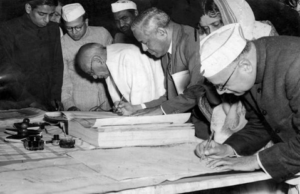Preparing for UPSC civil services is a never-ending learning experience. The rate of preparation can go up or slow down, but it will never cease. It’s vital to remember that this exam isn’t just a knowledge test; it’s also a way of determining a person’s overall competence to serve as a public servant.
When it comes to preparing for competitive examinations, having a winning preparation strategy is just as vital as studying for exams, and when clearing UPSC is the aim, the approach is crucial.
If you want to pass this famous exam but are unsure about the approach or need a jumpstart on your UPSC study, here are few key points that can help you pass the UPSC civil services prelims and main exams:
1. Revisiting the syllabus and previous year question bank!
Examining the curriculum and question bank from the previous year is very significant requirement. The syllabus and previous year question banks are two sacred books that must be kept on your study table at all times. The syllabus explains how to start with the end in mind, and the previous year’s question bank explains how much preparation you should do for CSE.
2. Newspaper Analysis should be followed!
Becoming a public servant is far more than just a means of finding a job; it is far more than a means of securing a living. It is critical for applicants to go over the material on a frequent basis in order to understand the exam’s demands. In order to prepare for the CSE, you must read the newspaper. Read any decent national newspaper, such as ‘The Tribune,’ but pay special attention to the analysis section. It’s crucial to remember that what not to read is just as important as what to read. It’s an art to know what to read in the newspaper, which you can learn by studying the previous year’s question bank.
3. Plan is Important!
Begin with devising a comprehensive and integrated plan for the UPSC civil services prelims and mains examinations. Divide the year into 12 months by assigning months to subjects that have a clear plan. This method is for neophytes; candidates who appear after their first try may have their own strategies for improving their ‘weak spots.’ As a result, comparing or mimicking others throughout the preparation process leads to poor self-confidence and wastes time.
- Make a list of all the static disciplines (history, geography, politics, etc.) and decide on the UPSC mains optional subject.
- Give yourself a head start on the optional courses by devoting a few hours each day to revising all of the General Studies subjects for both the UPSC prelims and mains.
- Shift the gears up a notch, start practising answer writing, and set aside one day a week for essay writing.
- Devote a significant amount of time to revising the UPSC mains optional subjects as well as all of the General Studies subjects.
4. Preparation for the Mains should also be focused!
An IAS applicant should plan his study schedule around the aforementioned timeline and complete the full syllabus before January 31. The CSE examination timeline reveals that the exam is announced in February, and the preliminary and main exams are held in June and October/November, respectively. The next four months (February, March, April, and May) can be dedicated solely to preparing for the preliminary exams. The Mains-focused preparation not only assists a student in covering the prelims material, but also prepares him for the long battle ahead of time.
5. Choice of Appropriate Optional is crucial!
Choosing the incorrect optional subject is a mistake that many civil service aspirants come to regret later in life. When selecting an optional subject, there are three crucial considerations to keep in mind. The subject’s score potential must be taken into account. Although literary disciplines have the highest success rate, students should be fluent in the language before choosing it as an elective.
Geography, history, public administration, philosophy, and sociology are the top five courses in civil service tests. Medical Science, Commerce and Accountancy, Animal Husbandry, Economics, and Psychology are the top five subjects in terms of success rate.
Aspirants must be enthusiastic about the subject. After a few months of preparation, a topic of disinterest will become tiresome. Having a lot of study material and skilled coaching will help you prepare much faster.
6. Consistent Newspaper Reading is significant!
Stacking material to be addressed later instead of reducing it increases the strain. Because the news is delivered on a daily basis, it should be read and comprehended on a daily basis by connecting it to static issues.
It’s a challenge to finish current affairs on time by sticking to the newspaper’s schedule. Anyone who can attain the dynamic of being in sync with the daily news flow by taking and updating notes has already won half the fight.
7. Beware of the Online Content!
While content is king for UPSC preparation, it can also be confusing for students who wind up scouring many web sources for resources. There is a deluge of knowledge available on the internet. Don’t be fooled by a plethora of internet content sources.
As a result, it is vital that you spend your time wisely on the numerous online platforms. Choose the ones that will save you time and help you prepare. Hoping from one to the next isn’t going to help much.
8. Decode the UPSC paper pattern!
Figure out how the exam questions are phrased. This procedure necessitates a thorough examination of all past years’ questions, with a keen eye on what is being asked and why. Attempt as many questions as possible, then examine why your questions were incorrect and how you may have done better.
9. Divide your syllabus into sections!
Begin by reviewing the UPSC Civil Services test contents and break it into sections. It will assist you in determining your main strengths and weaknesses. The next stage is to devise a strategy that prioritises the difficult issues before moving on to the less difficult ones.
10. Make a Proper Schedule and follow it with consistency!
Always remember not to set rushed or unrealistic UPSC study plans. It will overwhelm you in a matter of weeks and sap all of your motivation to prepare.
Take into account your current schedule, whether you’re a working professional or a student studying for college while preparing for the exam.
These considerations will assist you in determining how much time you have available each day. And once you’ve devised a strategy that fits your schedule, you’ll be able to stick to it.
11. Don’t Segregate Prelims and Mains Preparation!
Do not separate your preparation into two parts: Prelims and Mains.
Stop doing it right now if you regard the UPSC Prelims and Mains to be two separate exams. Because they are two portions of the exam with the identical syllabus, this is the case.
So, to perform well in both, begin practising response writing, essay writing, and note-taking right away. The goal should be to master the syllabus rather than specific exams.
12. Prepare your Own Notes should not be overlooked!
Candidates should take notes on both the static and dynamic aspects of the course. Many topics in politics, geography, science and technology, and international relations have both a static and dynamic nature. Compose notes using colours, drawings, and various artistic methods. It will excite your right brain and aid in better memorization of the subject.
13. Seek advice and guidance to ensure right path!
UPSC preparation takes a toll on aspirants’ mental and physical well-being. It can even lead to social isolation, but you need a safety net to fall back on if you want to maintain your mental health. As a result, make sure you keep in touch with your family and friends.
In fact, in certain situations, an experienced mentor can be really beneficial. When things go tough, the right advice might help you get back on track. Make a network of friends, mentors, and peers who will support you as you go through the preparation process.
14. Focus on Answer writing while preparing for Mains!
The UPSC mains examination is descriptive in nature, and your ability to write solid answers can make or break your chances. This is an art that may be learned through practice. Write at least two responses per week and ten in a month, and have your teachers verify them.
Remember the ‘3 Ps principle’ when crafting answers: Problem, Policy, and Prescription. Finally, don’t overlook the word ‘Essay.’
15. Evaluate yourself.
The crucial elements to remember during an evaluation are the exam questions you got incorrect, the themes you didn’t answer, and the tough questions you got wrong because you didn’t remember the facts. Make a point of writing down even the correct answers, as this will aid in remembering the themes in depth. This will assist you in determining whether or not you are on the correct route. When you begin preparing for the UPSC, keep track of your progress at each stage. It will assist you in keeping track of the things that require your attention.
16. Inculcate discipline, Perseverance, and self-motivation is the Key!
When talent does not work hard, hard effort wins. The secret to success in UPSC preparation is hard effort and persistence. So, throw your whole heart and soul into the work at hand, and leave the rest to God. Read success tales of candidates who came from humble beginnings and overcame all difficulties to become triumphant for self-motivation. Reading self-help books and biographies of famous leaders might also help you stay motivated.
The UPSC civil services test is considered one of India’s most prominent exams, with lakhs of students preparing for it each year. However, candidates who ace the exam have a conceptual and complete mastery of subjects, as well as a winning approach.
Begin your UPSC preparation with the goal of serving the country with your unique perspective and making a difference in the lives of many.



